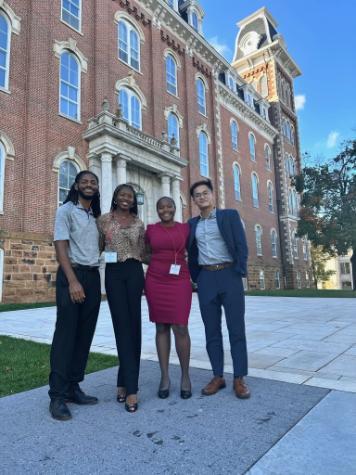The National Society for Minorities in Honors Conference took place October 25-27
 From left, Dr. TehQuin Forbes, Jasmyne Nelson, Jehlia Andrew-Brown and Phuc Phan at the University of Arkansas for the National Society for Minorities in Honors Conference.
From left, Dr. TehQuin Forbes, Jasmyne Nelson, Jehlia Andrew-Brown and Phuc Phan at the University of Arkansas for the National Society for Minorities in Honors Conference.
At a recent national conference focused on diversity in honors programs, several Honors students and Strategic Initiatives and Partnerships Coordinator Dr. TehQuin Forbes presented on how these programs address the needs of minority communities. The University of Arkansas hosted the National Society for Minorities in Honors Conference Oct. 25-27, consisting of panels, workshops and roundtables that discussed how honors colleges and programs cater to minority communities’ success, belonging, support and inclusion.
In the midst of the recent initiation of several new UF Honors affinity groups, Forbes presented on the sense of community affinity groups can bring to Black, indigenous and people of color and LGTBQ+ students. Three Honors students presented on other various aspects of UF’s program.
An Honors Luminary, 21-year-old psychology and criminology senior Jasmyne Nelson presented her experience being a Black student ambassador for the program. It is important to share Black perspectives and experiences to foster a sense of belonging for other students, she said. Hearing from other presenters, both students and faculty, also made the conference an important experience for her.
“I learned a lot about how different honors programs operate … Conferences like these are critical to achieving [minority representation in honors programs],” Nelson said.
Phuc Phan, a 21-year-old psychology junior, presented on Honors’ impact on them as a queer student of color and shared their experiences studying abroad with other Stamps Scholars and finding community with international United World College students. They felt confident presenting knowing that the conference’s goal was to have students share and empower each other’s stories, they said.
“I valued the opportunity to connect with other minority students in Honors … I learned a variety of ways that minority students across the country have been empowered by their respective Honors programs, their unique experiences, and how those are shaped by their intersectionality,” Phan said.
The benefits of UnCommon Classrooms for minority students were highlighted by Jehlia Andrew-Brown, a 21-year-old African American studies and psychology junior. These courses break barriers for marginalized students, she said, by focusing on niche subjects that connect to their unique experiences and interests and by facilitating direct contact with course content through educational trips. Andrew-Brown experienced this herself when she learned about the history and culture of the LGBTQ+ community in San Francisco, California in an UnCommon Classroom trip.
“There are so many barriers that can stand in one’s way to obtain a college education or immerse and enjoy themselves in college once there, but as programs, and even as current students, there is so much that Honors can do,” she said.
The conference gave Andrew-Brown a new appreciation for UF Honors’ student-centered approach. She said the program’s mantra of a “build-your-own” experience allows students to figure out what they want to do without restriction.
“[All collegiate honors programs should] ensure each honors student can fully benefit from an honors education, and that minority honors students, in particular, can feel safe, respected, and seen within their programs,” she said.
Written by UF Honors Communications Fellow, Bari Weiner. View the conference program here.

.png)